 phosh
phosh is graphical shell for mobile, touch based devices like
smart phones. It's the default graphical shell on Purism's
Librem 5 (and that's where
it came to life) but projects like
postmarketOS,
Mobian and
Debian have picked it up
putting it into use on other devices as well and contributing patches.
This post is meant as a short overview how things are tied together so
further posts can provide more details.
A PHone SHell
As mobile shell
phosh provides the interface components commonly
found on mobile devices to

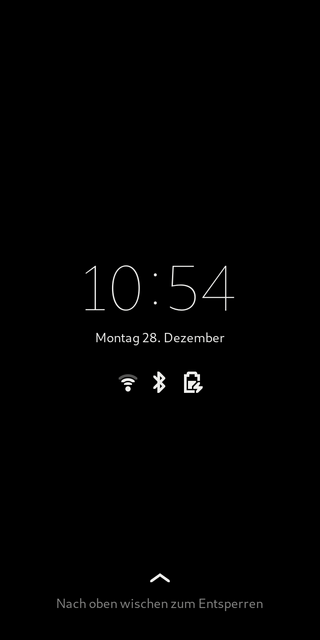

- launch applications
- switch between running applications and close them
- lock and unlock the screen
- display status information (e.g. network connectivity, battery level)
- provide quick access to things like torch or Bluetooth
- show notifications
It uses
GObject object system and
GTK to build up the user
interface components. Mobile specific patterns are brought in via
libhandy.
Since phosh is meant to blend into
GNOME as seamlessly as possible it
uses the common interfaces present there via
D-Bus like
org.gnome.Screensaver or
org.gnome.keyring.SystemPrompter and
retrieves user configuration like keybindings via
GSettings from preexisting
schema.
The components of a running graphical session roughly look like this:
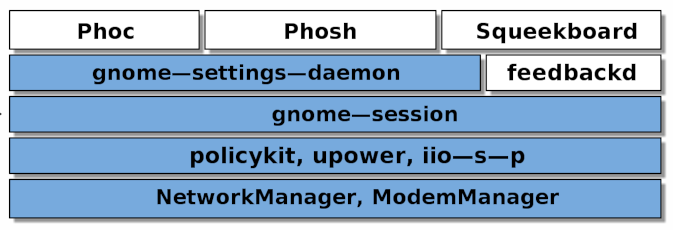
The blue boxes are the very same found on GNOME desktop sessions
while the white ones are currently only found on
phones.
feedbackd is explained
quickly: It's used for providing haptic or visual user feedback and
makes your phone rumble and blink when applications (or the shell)
want to notify the user about certain events like incoming phone calls
or new messages. What about phoc and squeekboard?
phoc and squeekboard
Although some stacks combine the graphical shell with the display server
(the component responsible for drawing applications and handling user
input) this isn't the case for phosh. phosh relies on a
Wayland
compositor to be present for that. Keeping shell and compositor apart
has some advantages like being able to restart the shell without
affecting other applications but also adds the need for some
additional communication between compositor and shell. This additional
communication is implemented via Wayland protocols. The Wayland
compositor used with phosh is called
phoc for
PHone
Compositor.
One of these additional protocols is
wlr-layer-shell.
It allows the shell to reserve space on the screen that is not used
by other applications and allows it to draw things like the top and
bottom bar or lock screen. Other protocols used by phosh (and hence implemented by phoc) are
wlr-output-management
to get information on and control properties of monitors or
wlr-foreign-toplevel-management
to get information about other windows on the display. The later
is used to allow to switch between running applications.
However these (and other) Wayland protocols are not implemented in
phoc from scratch. phoc leverages the
wlroots library for that. The library
also handles many other compositor parts like interacting with the
video and input hardware.
The details on how phoc actually puts things up on the screen deserves
a separate post. For the moment it's sufficient to note that phosh
requires a Wayland compositor like phoc.
We've not talked about entering text without a physical keyboard yet -
phosh itself does not handle that either.
squeekboard is the on
screen keyboard for text (and emoji) input. It again uses Wayland
protocols to talk to the Wayland compositor and it's (like phosh) a
component that wants exclusive access to some areas of the screen
(where the keyboard is drawn) and hence leverages the
layer-shell
protocol. Very roughly speaking it turns touch input in that area into
text and sends that back to the compositor that then passes it back to
the application that currently gets the text input. squeekboard's main
author dcz has some more details
here.
The session
So how does the graphical session in the picture above come into existence?
As this is meant to be close to a regular GNOME session it's done via
gnome-session that is
invoked somewhat like:
phoc -E 'gnome-session --session=phosh'
So the compositor
phoc is started up, launches
gnome-session which
then looks at
phosh.session for the session's components. These are
phosh,
squeekboard and
gnome-settings-daemon.
These then either connect to already running services via D-Bus
(e.g. NetworkManager, ModemManager, ...) or spawn them via D-Bus
activation when required (e.g. feedbackd).
Calling conventions
So when talking about phosh it's good to keep several things apart:
- phosh - the graphical shell
- phoc - the compositor
- squeekboard - the on screen keyboard
- phosh.session: The session that ties these and GNOME together
On top of that people sometimes refer to 'Phosh' as the software
collection consisting of the above plus more components from GNOME
(
Settings,
Contacs,
Clocks,
Weather,
Evince, ...) and components that
currently aren't part of GNOME but adapt to small screen sizes, use
the same technologies and are needed to make a phone fun to use
e.g.
Geary for email,
Calls for making phone calls and
Chats for SMS
handling.
Since just overloading the term Phosh is confusing
GNOME/Phosh
Mobile Environment or
Phosh Mobile Environment have been
used
to describe the above collection of software and I've contacted GNOME on how to name
this properly, to not infringe on the GNOME trademark but also give proper credit
and hopefully being able to move things upstream that can live upstream.
That's it for a start. phosh's development documentation can be
browsed
here but is
also available in the
source code.
Besides the projects mentioned above credits go to
Purism for allowing me and others to work on the
above and other parts related to moving Free Software on mobile Linux
forward.
 A short status update of what happened on my side last month. I spent
quiet a bit of time reviewing new, code (thanks!) as well as
maintenance to keep things going but we also have some improvements:
Phosh
A short status update of what happened on my side last month. I spent
quiet a bit of time reviewing new, code (thanks!) as well as
maintenance to keep things going but we also have some improvements:
Phosh
 The Brazilian translation team
The Brazilian translation team  Yesterday, the UBports core developer team released Ubuntu Touch Focal OTA-1
(In fact, Raoul, Marius and I were in a conference call when Marius froze and said: the PR team already posted the release blog post; the post is out, but we haven't released yet... ahhhh... panic... Shall I?, Marius said, and we said: GO!!! This is why the release occurred in public five hours ahead of schedule. OMG.)
For all the details, please study:
Yesterday, the UBports core developer team released Ubuntu Touch Focal OTA-1
(In fact, Raoul, Marius and I were in a conference call when Marius froze and said: the PR team already posted the release blog post; the post is out, but we haven't released yet... ahhhh... panic... Shall I?, Marius said, and we said: GO!!! This is why the release occurred in public five hours ahead of schedule. OMG.)
For all the details, please study: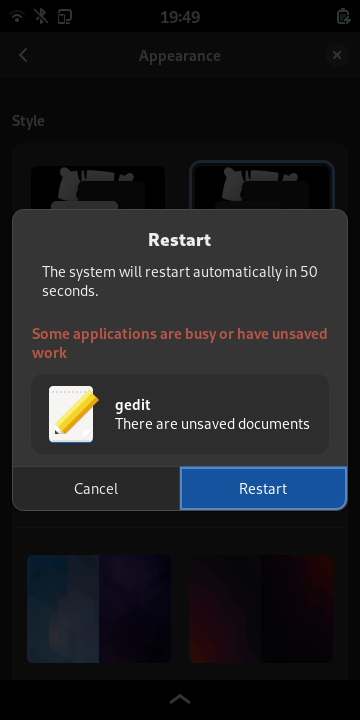
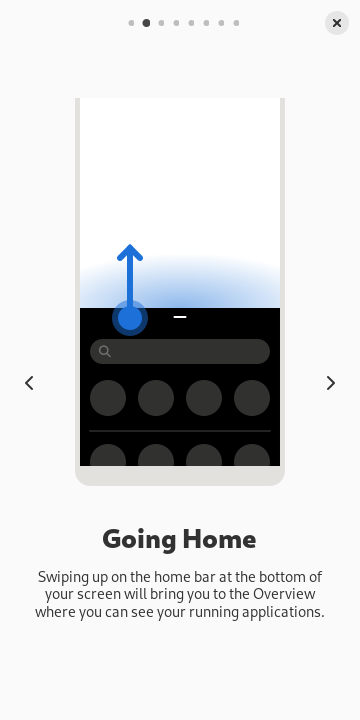 We also added the possibility to have custom widgets via loadable
plugins on the lock screen so the user can decide which information
should be available. We currently ship plugins to show
We also added the possibility to have custom widgets via loadable
plugins on the lock screen so the user can decide which information
should be available. We currently ship plugins to show
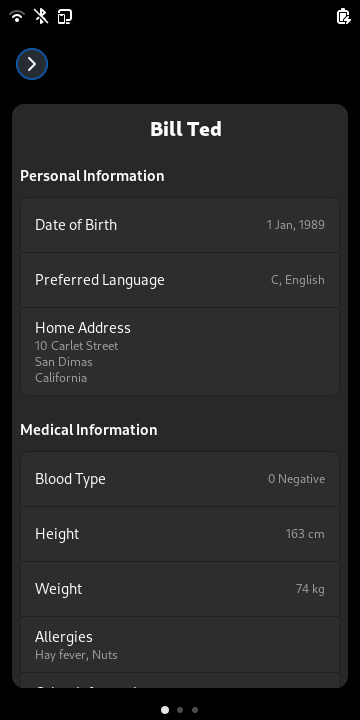
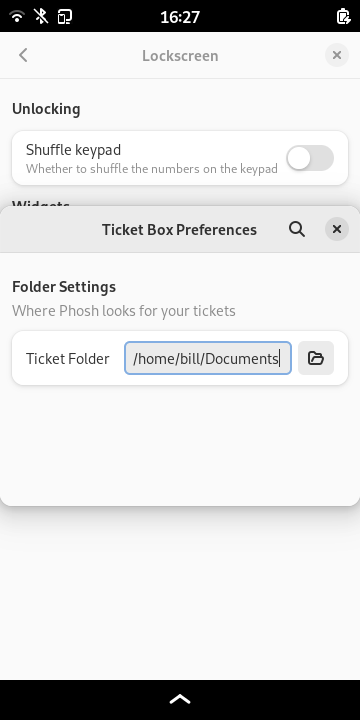 Speaking of configurability: Scale-to-fit settings (to work around
applications that don't fit the screen) and haptic/led feedback are
now configurable without resorting to the command line:
Speaking of configurability: Scale-to-fit settings (to work around
applications that don't fit the screen) and haptic/led feedback are
now configurable without resorting to the command line:
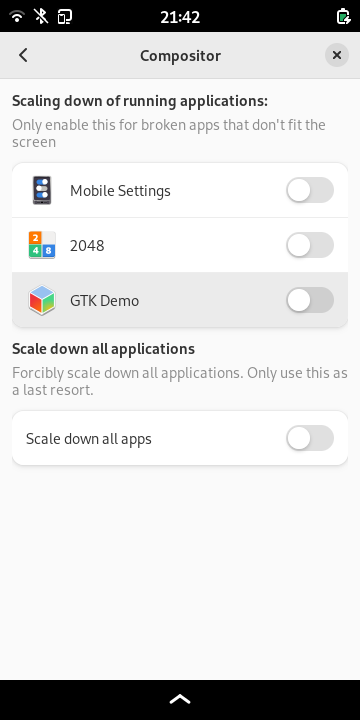
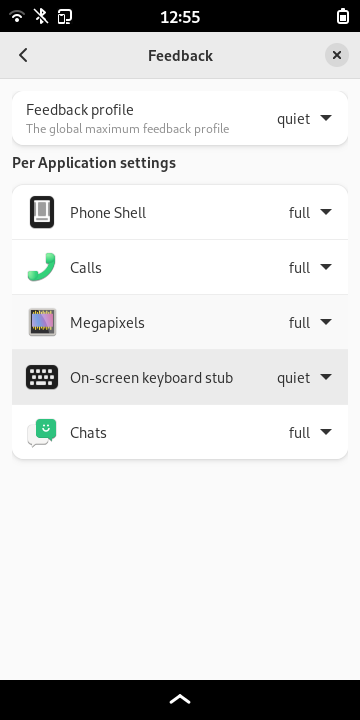 We can also have device specific settings which helps to temporarily
accumulate special workaround without affecting other phones.
Other user visible features include the ability to shuffle the digits
on the lockscreen's keypad, a VPN quick settings, improved screenshot
support and automatic high contrast theme switching when in bright
sunlight (based on ambient sensor readings) as shown
We can also have device specific settings which helps to temporarily
accumulate special workaround without affecting other phones.
Other user visible features include the ability to shuffle the digits
on the lockscreen's keypad, a VPN quick settings, improved screenshot
support and automatic high contrast theme switching when in bright
sunlight (based on ambient sensor readings) as shown 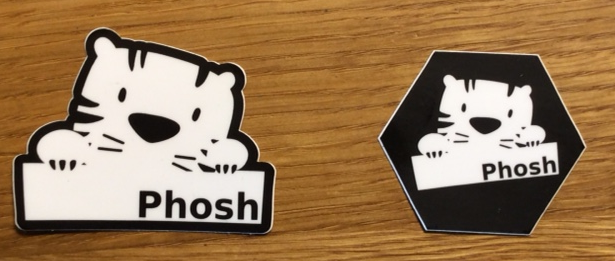 That's it for 2022. If you want to get involved into phosh testing, development
or documentation then just drop by in the
That's it for 2022. If you want to get involved into phosh testing, development
or documentation then just drop by in the 
 . The system talks about a back key but what back key I have no clue.
. The system talks about a back key but what back key I have no clue.
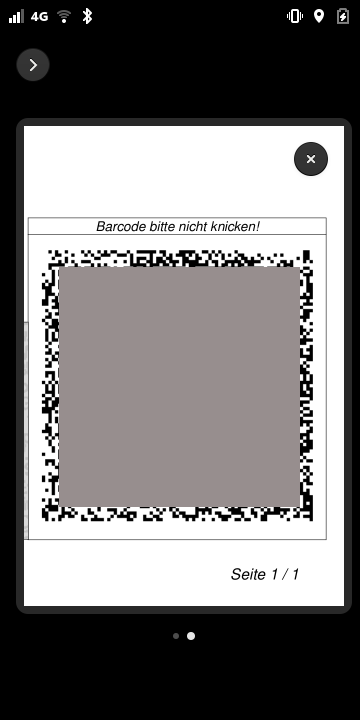
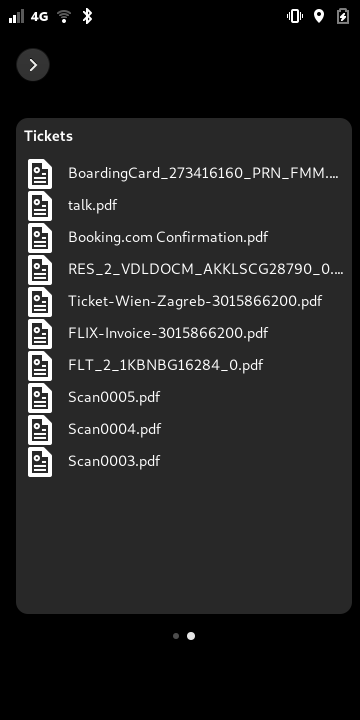 This was possible since
This was possible since  What about seeing the conference schedule on the phone?
What about seeing the conference schedule on the phone? 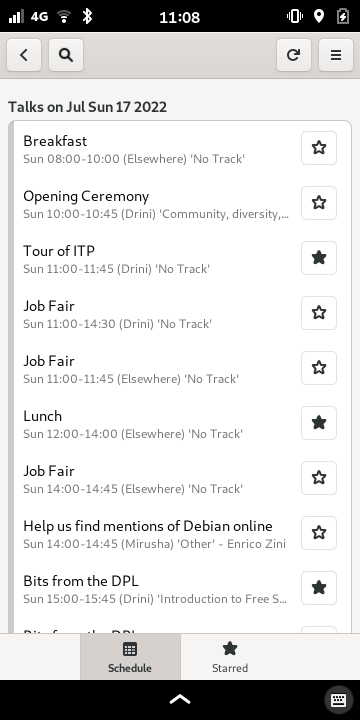 Since Debian's confy maintainer was around too, confy saw a bunch of
improvements over the conference.
For getting around
Since Debian's confy maintainer was around too, confy saw a bunch of
improvements over the conference.
For getting around 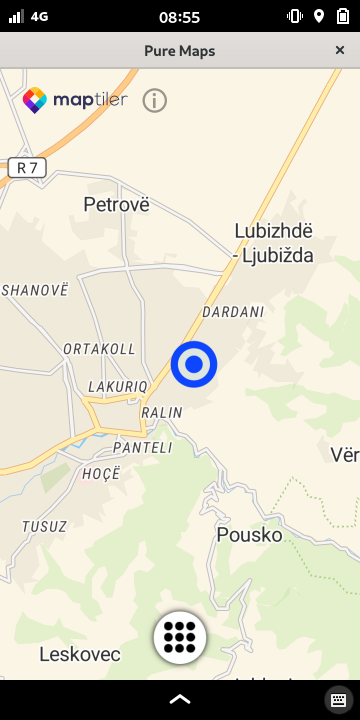 Puremaps currently isn't packaged in Debian but there's
Puremaps currently isn't packaged in Debian but there's  See
See 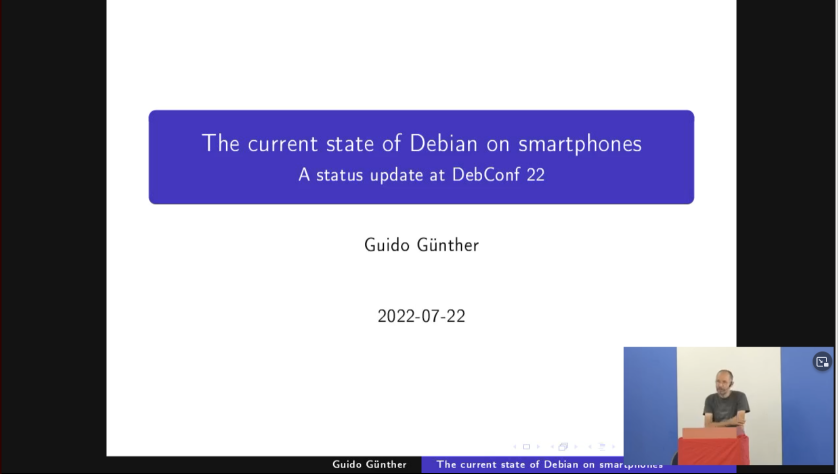
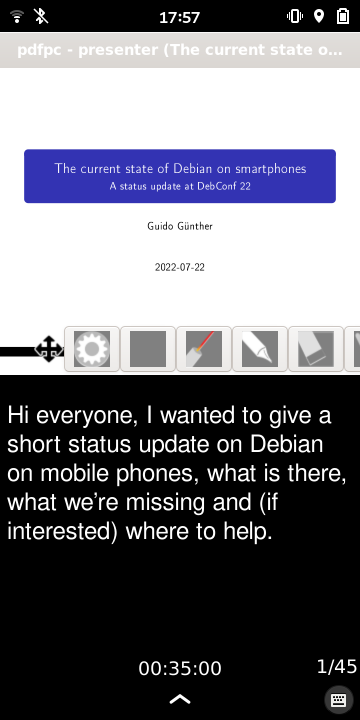 I had two great weeks in Prizren. Many thanks to the organizers of
Debconf 22 - I really enjoyed the conference.
I had two great weeks in Prizren. Many thanks to the organizers of
Debconf 22 - I really enjoyed the conference.



 The blue boxes are the very same found on GNOME desktop sessions
while the white ones are currently only found on
phones.
The blue boxes are the very same found on GNOME desktop sessions
while the white ones are currently only found on
phones.

 Like
Like 
](http://jmtd.net/log/coil/400x-coil.jpg)